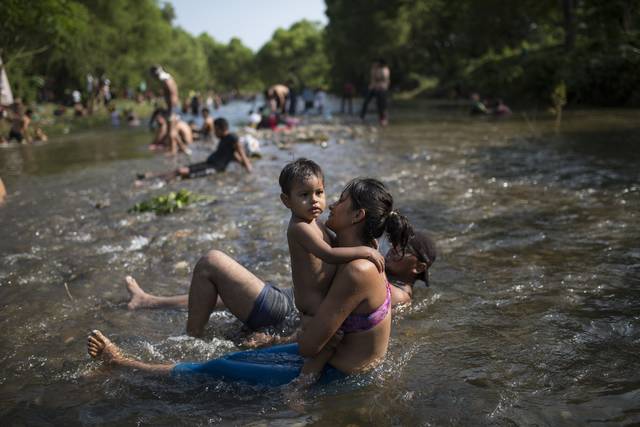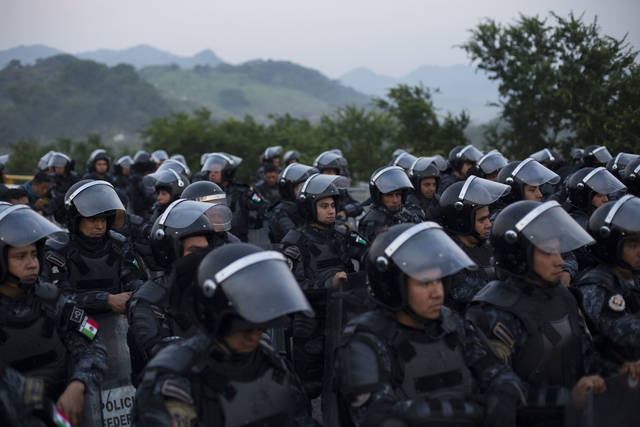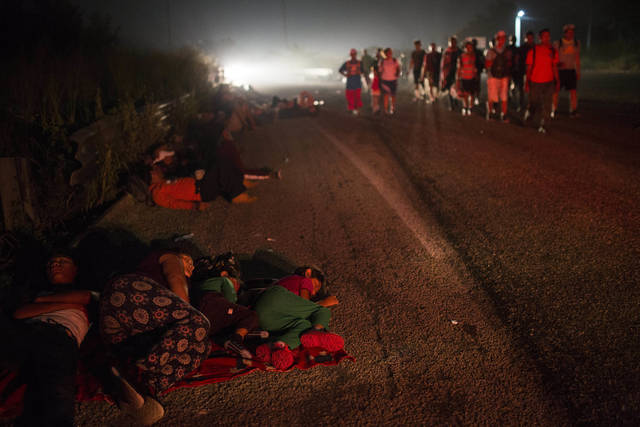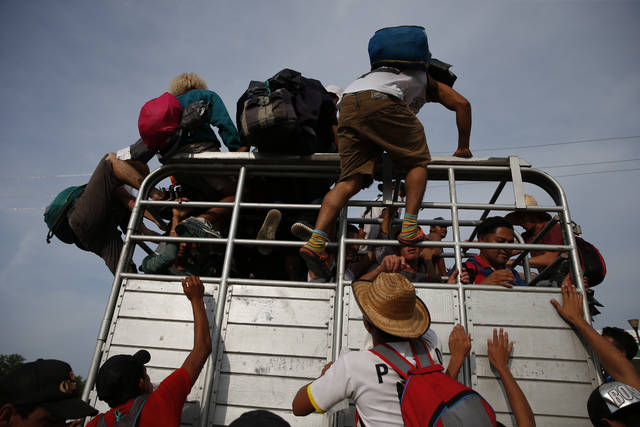TAPANATEPEC, Mexico — Thousands of Central American migrants took a break Sunday on their long journey through southern Mexico, but vowed to press ahead toward the U.S. border roughly 1,000 miles away, with Mexican government agencies seeming to waver between helping and hindering.
Some rested in the shade of tarps strung across the town plaza, or picked up trash. Others went to soak themselves in the nearby Novillero river.
The tensions of a long trek through searing heat with tenuous supplies of food and other goods spilled over Saturday night when a dispute over a food line evolved into the beating of a man falsely accused of child stealing.
Raul Medina Melendez, security chief for the tiny municipality of Tapanatepec in Oaxaca state said the town was distributing sandwiches and water to migrants camped in the central square Saturday night. When a man with a megaphone asked people to wait their turn, some men hurled insults at him. “Finally people got really angry and those below began to attack the guy,” Medina said.
As the man ran, a false rumor spread that he had grabbed a child for protection and he was caught and beaten. Police rescued him and took him to a hospital for treatment, though his condition wasn’t immediately clear.
On Sunday, several in the caravan took to microphones to denounce the attack.
“Is that the way we’re going to always behave?” a woman from Honduras asked. “Anytime there’s a rumor everyone is going to run to beat up someone?”
Others complained of a few smoking marijuana or complained that images of litter and uneaten food made them appear disrespectful.
On Saturday, an arm of the federal government for the first time seemed to be directly helping the migrants advance rather than trying to diminish the caravan. Grupo Beta, Mexico’s migrant protection agency, gave rides to stragglers and passed out water.
“There are people fainting, there are wounded,” said Martin Rojas, an agent of Grupo Beta who spoke to The Associated Press after dropping off a group of women and children in Tapanatepec after spotting them on a highway trudging through temperatures approaching 104 degrees Fahrenheit (40 degrees Celsius).
Other agencies, however, have periodically tried to impede or erode the mass migration, whose progress has led U.S. President Donald Trump to threaten action against Mexico.
Earlier Saturday, more than 100 federal police dressed in riot gear blocked a highway before dawn to encourage the migrants to apply for refugee status in Mexico rather than continuing the journey north.
Police let the caravan proceed after representatives from Mexico’s National Human Rights Commission convinced them that a rural stretch of highway without shade, toilets or water was no place for migrants to entertain an offer of asylum. Many members of the caravan have been travelling for more than two weeks, since a group first formed in San Pedro Sula, Honduras.
The caravan still must travel 1,000 miles (1,600 kilometers) to reach the nearest U.S. border crossing at McAllen, Texas. The trip could be twice as long if the 4,000 or so migrants head for the Tijuana-San Diego frontier, as another caravan did earlier this year. Only about 200 in that group made it to the border.
Most of the migrants in the caravan appeared determined to reach the U.S., despite an offer of refuge in Mexico.
Mexican President Enrique Pena Nieto launched a program on Friday dubbed “You are home,” which promises shelter, medical attention, schooling and jobs to Central Americans who agree to stay in the southern Mexico states of Chiapas or Oaxaca, far from the U.S. border.
Mexico’s Interior Ministry said that temporary identity numbers have been issued to 111 migrants, which would allow the migrants to stay and work in Mexico. The ministry said pregnant women, children and the elderly were among those who had joined the program and were now being attended at shelters.





